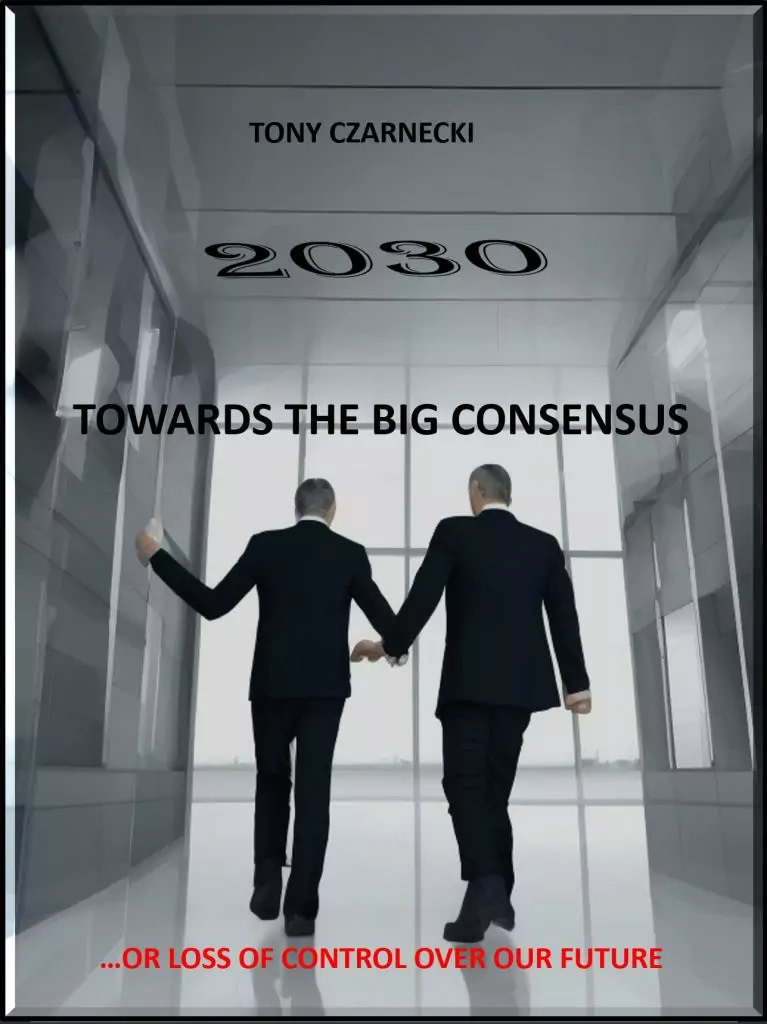London, 23 February 2023
Launch of a new book by Tony Czarnecki “2030- Towards the Big Consensus… Or loss of control over our future“
This is the fifth book by Tony Czarnecki, which in somewhat different way follows his previous books: “Who could save Humanity from Superintelligence?”, “Federate to Survive!“, “Democracy for a Human Federation” and “Becoming a Butterfly – Extinction or Evolution? Will Humans Survive Beyond 2050? “, covering the subject of humans’ transition to their coexistence with Superintelligence. Here is the introduction…
Has the second cold war already started? That’s the question I asked in an article in January 2020 when some experts thought the pandemic had been orchestrated by China. The appearance of Chinese balloons over the USA in February 2023 is a further confirmation that the second cold war has indeed started.
We can only hope that the war between the West and Russia/China remains cold. But even then, it will be played out with several existential threats simmering in the background. Before 1945 there were no man-made existential threats. Now three of them: Global Warming, Global Disorder and Artificial Intelligence (AI) may reach their tipping point simultaneously, by about 2030. At the same time, everything around us changes faster than ever in human history. Pace of change is nearly exponential. What in 2000 might have taken a decade can now be accomplished within a year.
Therefore, we must redraw all the rules and procedures to deliver the necessary changes before it is too late, so that we remain in charge of our future. In February 2023, the Ukrainian President gave a good example of what it means when he said about the decades-long process of becoming a member of the European Union: ‘we want to be a member of the EU by the end of 2024, not in a decade or two’.
What can we do to fight existential threats before they reach a tipping point of being out of control? As with Global Warming, 2030 is only a highly probable date, rather than a certainty for those three threats reaching their tipping point. It may also happen earlier, like with the loss of control over AI. Its impact on the future of Humanity is the greatest and most imminent.
If anybody had any doubt how fast AI can advance, then 2022 was the best example. The number of fundamental discoveries and inventions in AI in 2022 was the highest ever. But there are two events, which will impact our daily life most and increase the risk in the AI area even further and faster. The release of ChatGPT in December 2022 is a watershed moment. For the first time, the capabilities of the most advanced AI agent can now be accessed by anyone, rather than by only the top AI specialists. Then the second pivotal moment came in February 2023 when Microsoft and Google released an even more advanced AI Assistants BingChat and Bard with access to the Internet.
This opens a new era in AI. Instead of co-operation, which we have had until now, we will have competition, which means faster release of new AI products without proper safety checks. Although we will start benefiting from the fast advancement of AI capabilities it will be more important to see AI mainly as an existential threat. That is why this decade may be the most important in the human history since if we lose control over AI too early, we may not have enough time to mature it as a benevolent intelligence. Therefore, we need to maintain control over a maturing AI for as long as possible.
But who would take charge for protecting us before we destroy ourselves. We do not want to repeat again the grave consequences for the world of the Munich Agreement in 1938. What the war in Ukraine has shown is that the world can never again be paralysed by inaction because of lack of a united response by democratic countries. Although the UN could not stop the war, it may still play a crucial role in regulating AI, if it moves swiftly, since even China may support it. I offer some solutions on how that can be achieved.
However, we should acknowledge that there is no prospect in this decade for all countries agreeing to form the World Government as part of the United Nations. We may only hope to have a de facto World Government formed of most democratic countries. The book offers some options for forming such a de facto World Government, but even if we have it, how would it govern us? It could only play its function properly, if nations agree to limit some of aspects of their sovereignty.
We, as individual, may also have to agree for some of our freedoms to be restricted to minimize existential threats. Freedom as any other rights cannot exist without responsibilities and sometimes even sacrifice. But why should citizens trust their governments to restrict their freedoms and some rights, when today the trust in politicians is at the rock bottom? Therefore, the introduction of such restrictions may lead to serious social unrest in many countries.
The only way to rebuild the trust is to set up a new Social Contract between the governing and the governed and build a Big Consensus fast. The starting point might be the removal of political and social imbalances in societies by merging direct and representational democracy into a new type of democracy – Consensual Presidential Democracy. That is the key proposal considered in the book.

